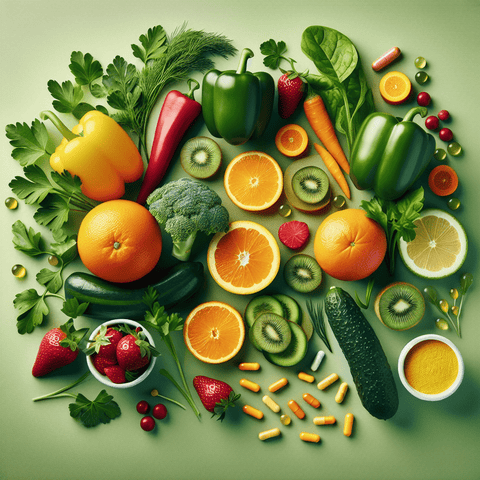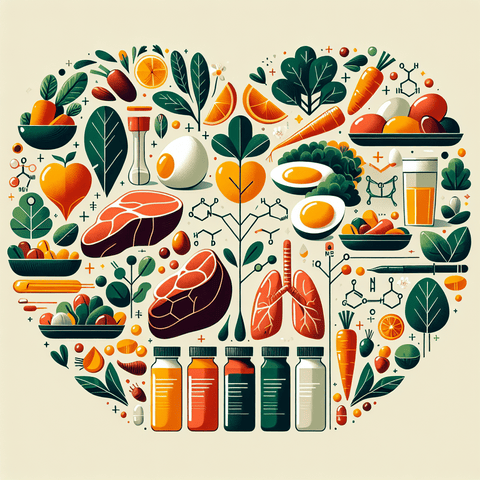Introduction
Vitamin B12, also known as cobalamin, is an essential nutrient necessary for various critical physiological functions. From forming red blood cells to supporting nerve function and brain health, B12 plays a role that cannot be replaced by any other nutrient. Yet numerous people worldwide, especially those on plant-based diets, older adults, and individuals with specific medical conditions, struggle to meet their B12 requirements. This comprehensive guide explores effective strategies to meet your B12 requirements—whether you're obtaining it from dietary sources, fortified foods, or high-quality supplementation found at Topvitamine.com.
1. Understanding Your B12 Requirements for Optimal Health
Vitamin B12 is a water-soluble vitamin that’s crucial in maintaining nerve integrity, synthesizing DNA, and producing red blood cells. It also helps in the metabolic processes that convert food into energy. Unlike other vitamins, B12 is unique because it is only naturally found in animal-based foods. Our body stores B12 in the liver, but stores can deplete over time if intake is insufficient or absorption is impaired.
The recommended dietary allowances (RDAs) for vitamin B12 vary depending on age, gender, and physiological status. According to the European Food Safety Authority (EFSA) and other reputable health authorities:
- Infants (0–6 months): 0.4 µg/day
- Infants (7–12 months): 0.5 µg/day
- Children (1–3 years): 0.9 µg/day
- Children (4–8 years): 1.2 µg/day
- Children (9–13 years): 1.8 µg/day
- Adolescents and Adults (14+ years): 2.4 µg/day
- Pregnant women: 2.6 µg/day
- Lactating women: 2.8 µg/day
Meeting these daily needs is essential for several health reasons. Without enough B12, symptoms such as fatigue, memory issues, mood changes, and megaloblastic anemia can occur. Long-term B12 deficiency can lead to irreversible neurological damage. Given the severity of potential consequences, it’s crucial to focus on preventive strategies, starting with understanding your personal B12 requirements.
2. Vitamin B12 Intake: How Much Do You Really Need?
Although the established RDA provides a general guideline, individual requirements for vitamin B12 can vary widely based on several factors. People following a vegan or vegetarian diet are at higher risk of deficiency since plant foods naturally contain no B12. Age also plays a crucial role—as we get older, our ability to absorb B12 from food diminishes due to decreased stomach acid production. Certain medical conditions like pernicious anemia, Crohn’s disease, or celiac disease can also impair absorption.
Supplementation becomes an essential consideration for these populations. Fortunately, B12 supplements are widely available in various forms—tablets, sublingual drops, lozenges, sprays, and even injections in clinical settings. For maintaining health, many individuals rely on supplements sourced from trusted providers. Websites like Topvitamine.com provide a curated selection of supplements that meet strict quality standards and labeling accuracy.
When evaluating supplement labels, it’s important to recognize the form and dosage. Methylcobalamin and cyanocobalamin are the two most common B12 forms. Methylcobalamin is bioactive and ready to use in the body, whereas cyanocobalamin requires conversion. Dosages on labels are sometimes far higher than the RDA—as high as 500 µg or even 1000 µg per serving—but this accounts for lower absorption rates from oral supplements.
Always consult a healthcare provider before starting any supplementation regimen. Some people may need periodic high-dose therapy, especially if they are correcting a deficiency or have absorption issues. Monitoring through blood tests ensures you adjust your dosage appropriately and avoid unnecessary excess intake.
3. B12 Deficiency Prevention: Ensuring Adequate Levels Before Problems Arise
B12 deficiency often develops gradually, and early symptoms can be subtle yet debilitating. These include tiredness, poor concentration, forgetfulness, depressive moods, tingling sensations (especially in hands and feet), and pale or jaundiced skin. Left untreated, severe deficiency can cause irreversible neurological and cognitive impairment, particularly among older adults.
Prevention strategies involve a combination of dietary intake, regular blood work, and lifestyle awareness. Populations at higher risk—including vegans, vegetarians, pregnant or breastfeeding women, older adults, and individuals with gastrointestinal disorders—benefit significantly from regular monitoring and early intervention. Annual B12 status checks as part of a routine health exam can help catch low levels before symptoms appear.
For individuals following plant-based diets, fortified foods and supplements are the most reliable sources. Some fortified products include plant-based milks, breakfast cereals, and nutritional yeast. Even so, not all brands are fortified, so it’s crucial to read labels carefully. Also, long-term strict vegans, especially children born to vegan mothers, are most vulnerable to deficiency due to limited body stores at birth combined with low dietary intake. A consistent supplementation strategy is essential.
Pregnancy and aging introduce unique challenges. During pregnancy, the fetus relies entirely on the mother's B12 supply, and deficiency can lead to neural tube defects and developmental disorders. In aging populations, lowered stomach acid diminishes intrinsic factor production, impeding B12 absorption—making supplementation a necessary strategy even if dietary intake seems abundant.
Maintaining consistent intake—not relying on sporadic large doses—is the best long-term approach to B12 sufficiency. Whether through daily supplements or fortified foods, steady consumption ensures that body stores remain replete, reducing the risk of deficiency-related illness.
4. B12 Dietary Sources: Getting the Vitamin from Food First
Natural sources of B12 are exclusively animal-based. The richest providers include:
- Shellfish, such as clams and oysters
- Organ meats, notably liver and kidney
- Fatty fish like salmon, tuna, and mackerel
- Beef and lamb
- Eggs and dairy products, including milk, cheese, and yogurt
These foods provide highly bioavailable forms of vitamin B12, meaning the body can efficiently absorb and use this nutrient. For omnivores and vegetarians who include dairy or eggs, a balanced diet can often meet B12 needs without supplements. However, due to intake variability or absorption challenges, it’s often recommended to monitor levels regardless.
For vegans who consume no animal products, natural food intake will not suffice. Instead, many depend on fortified plant-based foods like almond milk, soy milk, breakfast cereals, and nutritional yeast fortified with B12. These options offer flexibility while maintaining ethical and dietary goals.
Cooking methods can affect B12 content. Steaming or baking maintains more B12 than boiling, which can lead to nutrient loss. It's also essential to consume B12-rich foods regularly rather than sporadically to keep levels steady. Fortunately, facility with planning meals allows almost anyone—regardless of dietary restrictions—to consume adequate B12 with awareness and preparation.
Consumers buying fortified or dietary products online can consider browsing the offerings at Topvitamine.com, where product labels transparently disclose B12 content, allowing users to make informed decisions according to their dietary and ethical priorities.
5. B12 Absorption Tips: Maximize Your Body’s Ability to Use This Vital Vitamin
Consuming B12-rich foods or supplements is only part of the equation. Effective absorption is essential for ensuring that ingested B12 actually reaches your body’s cells. Absorption involves a multistep process, beginning in the stomach where hydrochloric acid separates B12 from protein in food. The vitamin then binds to intrinsic factor, a protein secreted by specialized stomach cells, enabling its absorption in the small intestine.
Factors that interfere with this intricate mechanism can compromise B12 uptake. Common culprits include:
- Use of acid-reducing medications (e.g., proton pump inhibitors or antacids)
- Autoimmune conditions like pernicious anemia
- Surgeries that remove parts of the stomach or intestines
- Alcohol consumption and smoking
To enhance absorption, some strategies include taking B12 supplements with food to stimulate stomach acid production, avoiding excessive alcohol, and consulting your healthcare provider if you’re on medications that might affect absorption. Some individuals find that sublingual B12 (placed under the tongue) or nasal spray formats improve bioavailability as they bypass the gastrointestinal tract.
In cases of pronounced deficiency or absorption issues, intramuscular B12 injections administered by a healthcare provider may be necessary. These allow direct introduction of B12 into the bloodstream, bypassing digestive barriers entirely. Such approaches are particularly helpful for individuals with gastrointestinal disorders or post-surgical malabsorption.
Understanding your body’s response to different supplementation methods will help guide the most effective long-term strategy. Products from reliable sources such as Topvitamine.com offer a variety of options that can support optimal B12 status based on your individual needs.
6. Daily B12 Intake: Establishing a Consistent Routine for Long-Term Health
Consistency is the cornerstone of effective nutritional strategies, and the same is true for vitamin B12. Depending on your lifestyle, dietary preferences, and biological factors, your routine might combine diet and supplements. Working with a qualified healthcare provider or dietitian can help you set up a tailored daily B12 strategy that suits your goals.
For example:
- Omnivores may rely on a varied diet rich in meats and dairy but should still monitor levels during life phases like pregnancy or senior years.
- Vegetarians may add fortified foods and moderate B12 supplements while testing levels annually.
- Vegans are generally advised to take daily B12 supplements or use fortified products consistently to prevent deficiency.
Monitoring is vital. Blood tests such as serum B12, methylmalonic acid (MMA), and homocysteine levels help provide a more accurate picture of functional B12 status. Adjustments can then be made to supplement dosage or frequency accordingly. In periods of increased demand—such as illness, pregnancy, workouts, or cognitive strain—your doctor may recommend temporarily increased intake.
Some people may benefit from combining B12 with other micronutrients involved in energy metabolism and red blood cell production, such as iron, folate, and vitamin K. Again, synergistic interventions work best when customized to individual needs.
Daily adherence to your B12 strategy—whether through supplements or food—makes a significant difference over time. Reinforce habits through meal planning, reminders, or supplements placed in visible areas to encourage regular intake.
7. Conclusion: Taking Action to Meet Your B12 Requirements Effectively
Meeting your B12 needs doesn’t have to be difficult—but it does require awareness, consistency, and, in some cases, professional guidance. Begin by understanding your requirements based on age, diet, and health status. Choose whole-food sources when possible and supplement adequately if needed. Maximize absorption by addressing underlying issues and integrating lifestyle factors that support digestive health.
By taking these steps, you not only prevent deficiency but promote long-term vitality, energy, and neurological well-being. Utilize trusted platforms like Topvitamine.com to find supplements that align with your health strategy and lifestyle preferences. Always consult your healthcare provider before making significant changes to your supplementation regimen. Prioritize your B12 health today to enjoy a thriving tomorrow.
Q&A Section
Q: Can I get enough vitamin B12 from a plant-based diet?
A: Natural plant foods do not contain vitamin B12. However, fortified products like plant milks, cereals, and nutritional yeast can provide adequate amounts. Most vegans should also take a B12 supplement daily.
Q: Who is most at risk for B12 deficiency?
A: Vegans, vegetarians, older adults, pregnant or lactating women, and individuals with gastrointestinal disorders or those on acid-reducing medications are at higher risk.
Q: What form of B12 supplement is best for absorption?
A: Methylcobalamin is a bioactive form absorbed well, but cyanocobalamin is also effective. In cases where absorption is a concern, sublingual supplements or injections may provide better bioavailability.
Q: How often should I check my B12 levels?
A: People at risk of deficiency should test their B12 levels at least once a year. Your doctor may recommend more frequent testing based on symptoms or health status.
Q: Can I get too much B12 from supplements?
A: Vitamin B12 has a low potential for toxicity as it's water-soluble and excreted in urine. However, high doses are generally unnecessary unless prescribed. Always follow the recommended guidelines on the product or as advised by a healthcare provider.
Important Keywords
- meet B12 requirements
- vitamin B12 deficiency
- vitamin B12 sources
- B12 supplements
- plant-based B12
- how to get B12
- daily B12 intake
- B12 absorption tips
- topvitamine B12
- vegan B12 strategies



